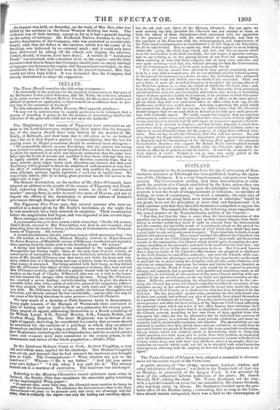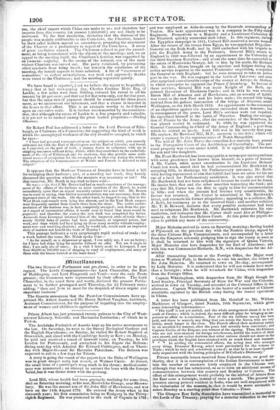SCOTLAND.
The memorial to the Government from the late Convocation of' Non- intrusion ministers at Edinburgh has been published, bearing the signa- ture of Dr. Chalmers. It is a very long document, and goes over beaten ground. The Convocation declare, that their determination to relin- quish the position of a Church established by the State, unless they can have liberty to maintain and act upon the principles which they have avowed, is not the result of disappointment or irritation : no sacrifice of feeling, or even of consistency, " to avert a calamity, the very idea of which they have all along been most reluctant to entertain," would be too great, were not the principles at issue vital and fundamental : it is with extreme pain that they have felt themselves compelled to oppose the Civil Courts. The remarkable thing is, the following clear exposition of the actual posture of the Nonintrusionist section of the Church-
" But they feel that the time is come when the final determination of this question can be postponed no longer; and as they cannot disguise from them- selves, so neither would they deem it right to conceal from the Government and the country, the inevitable result of a continued refusal on the part of the Legislature of that indispensable measure of relief which they think they have a good right to ask and good reason to expect. Their situation, in truth, is most painful and embarrassing. They cannot conduct the affairsof the Church in the manner in which the Civil Courts have prescribed : they could not themselves remain in the communion of a Church which should agree to regulate her pro- cedure according to the principles now held to be involved in the civil law ; nor can they allow others in the same communion to do so. But it is well known that a large minority of the Church's office-bearers are prepared, in obedience to the Civil Courts, to cast Ober authority ; and were the Church, while con- tinuing to claim the advantages secured to her by law, to persevere, as she must in principle do, in maintaining her discipline over all who, under whatever civil sanction or compulsion, transgress her orders and violate her laws, founded, as she believes, on the Word of God—not only would she be exposed to grievous obloquy and reproach, but a spectacle both painful and scandalous must, in all probability, be exhibited, of two sections of the same Church striving with one another in the use of civil pains on the one hand and spiritual censures on the other. Hitherto, notwithstanding the allegations of her enemies to the con- trary, the Church has never felt herself compelled to inflict the severities of her discipline on any of her ministers or members for an act done under the com- pulsion of her Civil Courts, or in obedience to what has been declared to be the civil law. She has proceeded against none, excepting the few individuals who of their own accord, and without any plea of necessity, have placed themselves in a position of defiance of authority. Even this, however, has led to unseemly consequences; and after the final decision of the Supreme Civil Court, affirming the principles upon which not a few of her office-bearers have intimated their determination to act, it is plain that if no Legislative relief be conceded, and if' the Church proceed, according to her own views of duty, against those who transgress her rules, she has no alternative but to deal forth her censures of ecclesiastical power, in a manner that must provoke retaliation, and must ne- cessarily lead to inextricable confusion and disorder. The memorialists are not ashamed to confess that they shrink from such an exhibition as would thus be presented before the people of Scotland : and this is one practical consideration, among others, which has weighed much in determining them to bring this whole question to a final issue, and to retire from their position, as connected with the Establishment, rather than prolong an unseemly contest with the Civil Courts, which deny, and with their own brethren, who tut at nought, their ju- risdiction—a contest which could not fail to be attended with moat disastrous consequences, affecting both the majesty of law and the higher interests of re- ligion."
The Town-Council of Glasgow have adopted a memorial to Govern- ment for the entire repeal of the Corn-laws.
A public meeting of "the clergy, merchants, bankers, traders, and other inhabitants of Glasgow," was held in the Trades-hall of that city on Monday, in promotion of the League Fund. It was attended by most of the influential Liberal politicians of the place ; Mr. James Oswald, M.P., taking the chair. Mr. Walter Buchanan led the way, with a speech founded on notes for one intended by Mr. James Graham, who was kept away by illness. Mr. Buchanan touched upon the pro- bable effect of the Nankin treaty ; contending, that so long as the Corn- laws should remain =repealed, there was a limit to the consumption of
tee, the chief export which China can make to us ; and therefore her imports from this country (at present 1,200,0000 are not likely to be increased. To the first resolution, declaring that the distress of the people was mainly attributable to the Corn-laws, the Chartists, headed by their usual leaders, moved an amendment, proposing the enactment of the Charter as a preliminary to repeal of the Corn-laws. A scene of great confusion ensued. The Chairman refused to put the amend- ment, as being inconsistent with the objects of the meeting; and, on an appeal to the meeting itself, the Chairman's decision was supported by an immense majority. In the course of the turmoil, one of the most violent Chartists was turned out. His party retaliated, by preventing other speakers from being heard ; but towards the conclusion of the meeting, the tumult appears to have subsided. A list of "conveners of committee," to collect subscriptions, was read and approved ; thanks were voted to the Chairman ; and the meeting separated quietly.
We have heard it reported, (and we believe the report to be perfectly true,) that at last rent-paying day, Charles Graham Moir, Esq. of Leckie, a few miles west from Stirling, reduced his rental to all his tenants by 20 per cent ; and that not for that term only, nor for that year, but that the same rate of payment should be continued for three years more, as we understood our informant, and that a clause is inserted in the leases to that effect. This is an example worthy to be followed upon an extensive scale. It is further recommended by the considera- tion, that although the estate of Leckie is a fine property and valuable, it is yet not to be ranked among the great landed properties.—Stirling Observer.
Sir Robert Peel has addressed a letter to the Lord Provost of Edin- burgh, as Chairman of a Committee for suggesting the kind of work in which the unemployed workmen of the city should be occupied, in which he says- " I have had personal communication on the subject on *illicit you recently addressed me with the Earl of Haddington and the Earl of Lincoln ; and found, as I expected, on the part of both, a sincere desire to cooperate with me in adopting measures without delay, which, while they contribute to the embellish- ment of the city of Edinburgh and its environs, may also provide some addi- tional means of occupation for the unemployed in that city during the winter. The attention of the Commissioners of Woods and Forests is directed to this subject."
It appears that the Harbour Trustees of Dundee have in hand a bill for enlarging their harbour ; and, at a meeting last week, they keenly discussed the question whether the measure was necessary or not ? On that occasion, Mr. Neish is reported to have said— He was certain that if Mr. Brown had had as much experience of the manage- ment of the affairs of the harbour as some members of the Board, he would immediately agree that an urgent necessity existed for a new bill. Mr. Brown was in error in saying, that farther accommodation was not necessary, from the depressed state of the trade. On the other band, he begged to say, that in the West Dock coal-vessels were lying five abreast, and in the East Dock cargoes were frequently carried from vessels three from the shore. The entire accom- modation of the harbour was, in fact, completely occupied; and, from the pre- Et, it aspect of commercial affairs, it would soon be found that more would be „required; sad therefore the sooner the new dock was completed the better. Accounts from Liverpool informed him of the improved state of trade there: nearly 50,000 bales of cotton bad been purchased, at improved prices, last week, and ships which had been lying up these many months without employ- ment were now receiving charters ; and, he would ask, would such an improved state of matters not benefit the trade of Dundee ?
This passage indicates a very surprisingly rapid revival of trade ; for a week before the same Mr. Neish spoke thus- " As for myself, as a shipowner or agent, I can safely say, I am no better ; for I have had ships lying for months without an offer. Nor am I single in this; I am only one of many. In a visit I lately made to Liverpool, I saw from 80,000 to 100,000 tons of shipping in want of employment, and many of them with the broom hoisted at the mast-head."



























 Previous page
Previous page